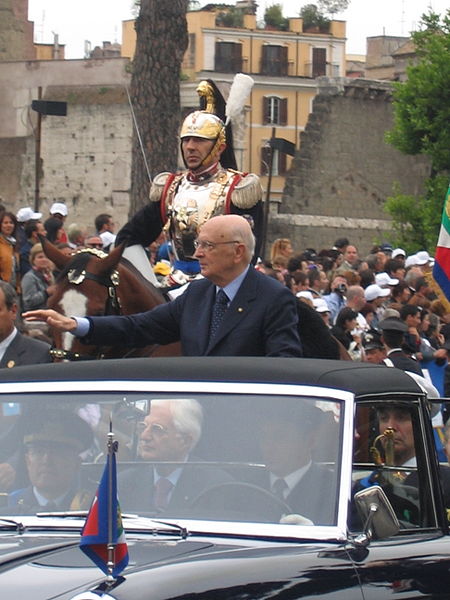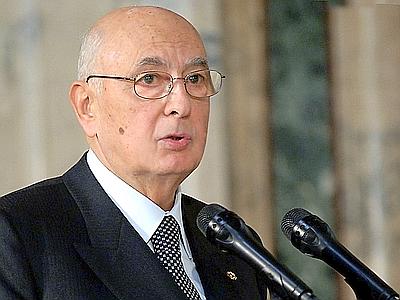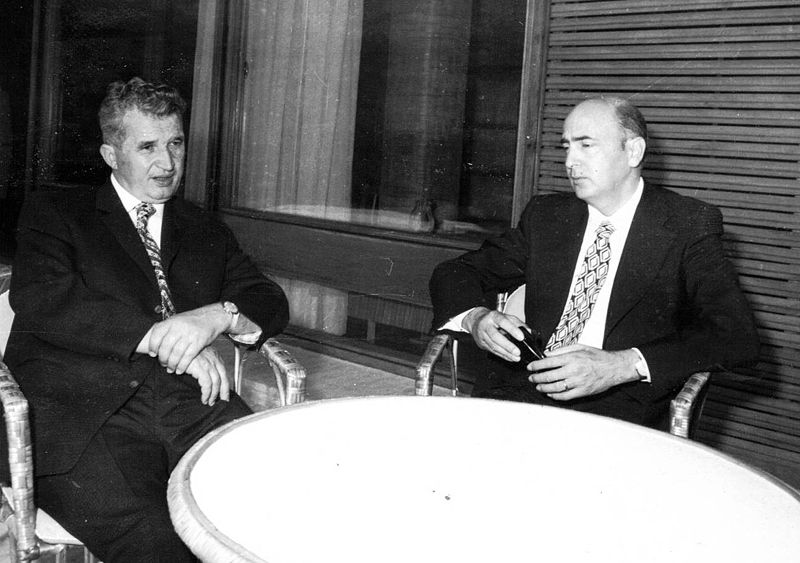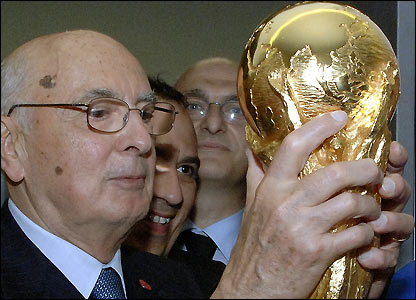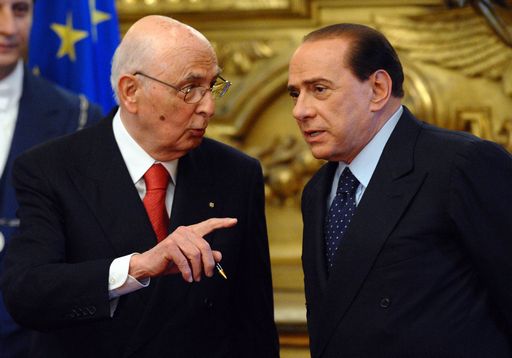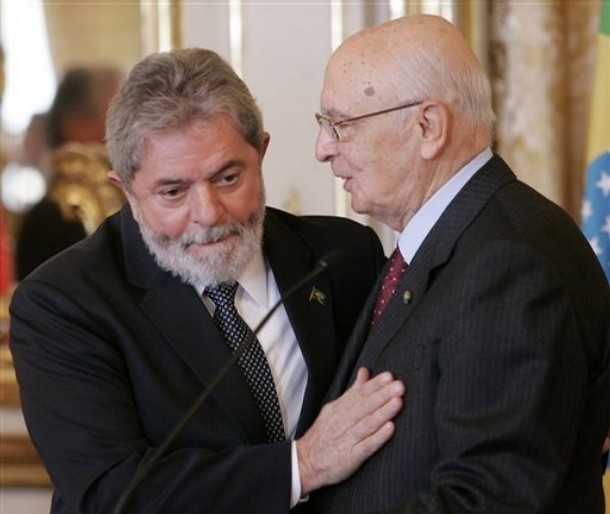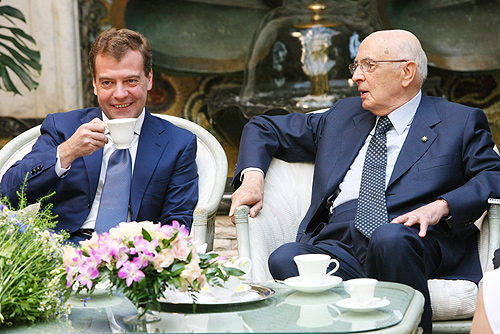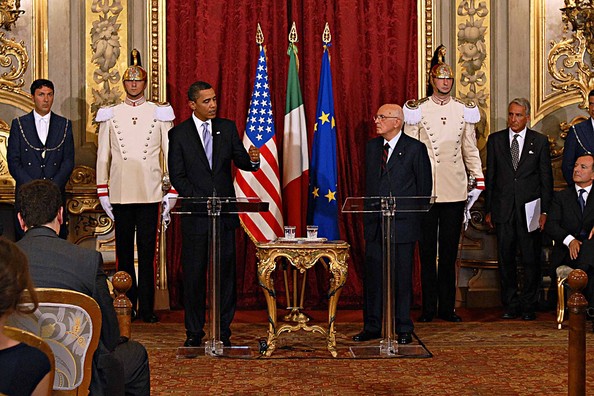<Back to Index>
- Mathematician Christos Dimitriou Papakyriakopoulos, 1914
- Poet Manuel Altolaguirre, 1905
- 11th President of Italy Giorgio Napolitano, 1925
PAGE SPONSOR
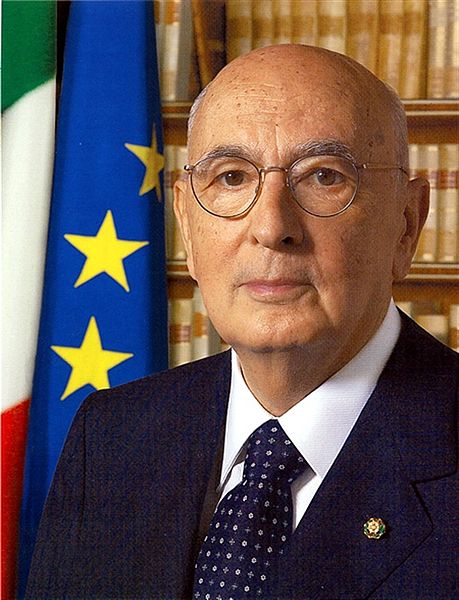
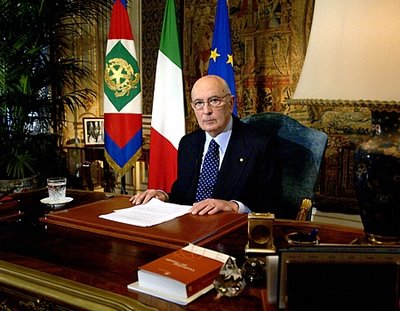
Giorgio Napolitano (born 29 June 1925) is an Italian politician and former lifetime senator, the 11th and current President of the Italian Republic. His election took place on 10 May 2006, and his term started with the swearing - in ceremony held on 15 May 2006. He is the first President of Italy to have been a member of the Italian Communist Party.
Giorgio Napolitano was born in Naples. In 1942 he matriculated at the University of Naples Federico II. He adhered to the local Gioventù Universitaria Fascista ("University Fascist Youth"), where he met his core group of friends, who shared his opposition to Italian fascism. As he would later state, the group "was in fact a true breeding ground of anti - fascist intellectual energies, disguised and to a certain extent tolerated".
A theatre enthusiast since high school, during his university years he contributed a theatrical review to the IX Maggio weekly magazine, and had small parts in plays organized by the Gioventù Universitaria Fascista itself. He played in a comedy by Salvatore Di Giacomo at Teatro Mercadante in Naples. Napolitano dreamed of being an actor and spent his early years performing in several productions at the Teatro Mercadante. He later measured himself against Joyce and Eliot.
He has often been cited as the author of a collection of sonnets in Neapolitan language, published under the pseudonym Tommaso Pignatelli, entitled "Pe cupià ’o chiarfo" ("To mimic the downpour"). He denied this in 1997 and, again, on the occasion of his presidential election, when his staff described the attribution of authorship to Napolitano as a "journalistic myth".
During the existence of the
Italian Social Republic, a puppet state of Nazi Germany in the final period of World War II, he and his circle of friends took part in several actions of the Italian resistance movement against German and Italian fascist forces. This included occupying the offices of the IX Maggio magazine and using it to publish writings of Karl Marx masked as articles signed by the various components of the group.
Following the end of the war in 1945, Napolitano joined the Italian Communist Party (Partito Comunista Italiano, PCI). In 1947, he graduated in jurisprudence with a final thesis on political economy, entitled "Il mancato sviluppo industriale del Mezzogiorno dopo l'unità e la legge speciale per Napoli del 1904". (Italian for "The lack of industrial development in the Mezzogiorno following the unification of Italy and the special law of 1904 for Naples").
He was first elected to the Chamber of Deputies in 1953 for the electoral division of Naples, and was returned at every election until 1996. He was elected to the National Committee of the party during its eighth national congress in 1956, largely thanks to the support offered by Palmiro Togliatti, who wanted to involve younger politicians in the central direction of the party. He became responsible for the commission for Southern Italy within the National Committee.
Later on in the same year, the 1956 Hungarian Revolution and its military suppression by the Soviet Union occurred. The leadership of the Italian Communist Party labelled the insurgents as counter - revolutionaries, and the party newspaper L'Unità referred to them as "thugs" and "despicable agents provocateurs". Napolitano complied with the party sponsored position on this matter, a choice he would repeatedly declare to have become uncomfortable with, developing what his autobiography describes as a "grievous self - critical torment". He would reason that his compliance was motivated by concerns about the role of the Italian Communist Party as "inseparable from the fates of the socialist forces guided by the USSR" as opposed to "imperialist" forces.
The decision to support the USSR against the Hungarian revolutionaries generated a split in the Italian Communist Party, and even the CGIL (Italy's largest trade union, then supportive of the PCI) refused to conform to the party sponsored position and applauded the revolution, on the basis that the eighth national congress of the Italian Communist Party had indeed stated that the "Italian way to socialism" was to be democratic and specific to the nation. These views were supported in the party by Giorgio Amendola, whom Napolitano would always look up to as a teacher. Frequently seen together, Giorgio Amendola and Giorgio Napolitano would jokingly be referred to by friends as (respectively) Giorgio 'o chiatto and Giorgio 'o sicco ("Giorgio the pudgy" and "Giorgio the slim" in the Neapolitan dialect).
Napolitano then became the party's federal secretary in Naples and Caserta and later, between 1966 and 1969, he was coordinator of the secretary's office and of the political office. During the 1970s and the 1980s he was the officer responsible first for culture and later for the economic policy and the international relations of the party.
His political ideas were somewhat moderate in the context of the PCI: in fact he became the leader of the so-called "meliorist wing" (corrente migliorista) of the party, whose members notably included Gerardo Chiaromonte and Emanuele Macaluso. The term migliorista (from migliore, Italian for "better") was coined with a slightly mocking intent.
In the mid-seventies, Napolitano was invited by the Massachusetts Institute of Technology to give a lecture, but the then United States ambassador to Italy, John A. Volpe, refused to grant him a visa on account of his membership in the Communist Party. Between 1977 and 1981 Napolitano had some secret meetings with the United States ambassador Richard Gardner, at a time when the PCI was seeking contact with the US administration, in the context of its definitive break with its past relationship with the Communist Party of the Soviet Union and the beginning of eurocommunism, the attempt to develop a theory and practice more adequate to the democratic countries of Western Europe. He was an active member of the party until it ended in 1991. In 2006, when Napolitano was elected President of the Italian Republic, Gardner stated to AP Television News that he considered Napolitano "a real statesman", "a true believer in democracy" and "a friend of the United States [who] will carry out his office with impartiality and fairness". Thanks to this role and in part by the good offices of Giulio Andreotti, in the 1980s Napolitano was able to travel to the United States and give lectures at Aspen, Colorado, and at Harvard University. He has since visited and lectured in the United States several times.
After the dissolution of the Italian Communist Party, in 1992, Napolitano joined the Democratic Party of the Left, later Democrats of the Left (Democratici di Sinistra, or DS). Successively, he served as President of the Chamber of Deputies (1992 – 1994), and between 1996 and 1998 he was the first former Communist to become Minister of the Interior, a role traditionally occupied by Christian Democrats. In this capacity, he took part together with fellow lawmaker and Cabinet Minister Ms. Livia Turco in
drafting the government sponsored law on immigration control
(Legislative Decree No. 40 of 6 March 1998), better known as the
"Turco - Napolitano bill". He also served as a Member of the European Parliament from 1999 to 2004. In October 2005, he was named senator for life, and was therefore one of the last two to be appointed by President of the Republic Carlo Azeglio Ciampi, together with Sergio Pininfarina.
In 2006, his name was frequently suggested for the office of President of the Italian Republic. Napolitano was the second person proposed by the centre - left majority coalition, The Union, in place of Massimo D'Alema, after the chance of a joint vote on D'Alema had been rejected by leaders of the centre - right coalition The House of Freedoms. Even though Napolitano appeared at first a candidate The House of Freedoms could converge on, the proposal was rejected much like that of D'Alema.
The centre - left majority coalition, on 7 May 2006, officially endorsed Giorgio Napolitano as its candidate in the presidential election that began on 8 May. The Vatican endorsed him as President through its official newspaper, L'Osservatore Romano, just after the Union named him as its candidate, as did Marco Follini, former secretary of the UDC, the right leaning Christian party, member of the House of Freedoms.
Napolitano
was elected on 10 May, in the fourth round of voting — the first round
which required only an absolute majority, unlike the former three which
required two - thirds of the votes — with 543 votes (out of a possible
1009). He was the first former Communist to become President of Italy,
as well as the third Neapolitan after Enrico De Nicola and Giovanni Leone. At the age of 80, he became the first ex-communist elected to be the
President of the Italian Republic. He came out of retirement to accept. After his election, expressions of esteem toward his person and his authority as future President of the Italian Republic were made by both members of the Union and of the House of Freedoms (who had issued a blank vote), such as Pier Ferdinando Casini. Nevertheless, some Italian right - wing newspapers, such as il Giornale, expressed concerns about his communist past. He started his term on 15 May.
On 9 July 2006, Napolitano was present at the FIFA World Cup final, in which the Italian team defeated France and won its fourth World Cup, and afterwards he joined the players' celebrations. He is the second President of the Italian Republic to be present at a triumphal World Cup final, after Sandro Pertini.
On 26 September 2006, Napolitano made an official visit to Budapest, Hungary, where he paid tribute to the fallen in the 1956 revolution, which he initially opposed as member of the Italian Communist Party, by laying a wreath at Imre Nagy's grave.
On 10 February 2007 a diplomatic crisis arose between Italy and Croatia, after President Napolitano publicly condemned the karst sinkhole (foibe) massacres on Foibe Memorial Day, saying it was the “barbarism of the century,” “Slavic bloodthirsty hatred,” and “aspirations to annex territory”. The European Commission did not comment on this event, but did comment on (and partly condemn) the response by Croatian president Stjepan Mesić, who described Napolitano's statement as racist because Napolitano did not refer to either Slovenians or Croatians as a nation when he spoke about a "Slavic annexationist aspiration" for the Julian March (at the time, Slovenians and Croatians fought together in the Yugoslav Resistance Movement). Another matter of debate in Croatia was that the Italian President made awards to relatives of 25 foibe victims, who included the last fascist Italian prefect in Zadar, Vincenzo Serrentino, convicted to death in 1947 in Šibenik. That was seen by Mesić as "historic revisionism" and open support for revanchism. President Napolitano's remarks on the foibe massacres were praised by both centre - left and centre - right in Italy, and both coalitions condemned Mesić's statements, while the whole of Croatia stood by Mesić, who later acknowledged that Napolitano didn't want to put in discussion the Peace Treaty of 1947.
On 21 February 2007, Prime Minister Romano Prodi submitted his resignation after losing a foreign policy vote in the Parliament; Napolitano
held talks with the political groups in parliament, and on 24 February
rejected the resignation, prompting Prodi to ask for a new vote of confidence. Prodi won the vote in the upper house on 28 February and in the lower house on 2 March, allowing his cabinet to remain in office.
On 24 January 2008, Romano Prodi lost a vote of confidence in the Senate by a vote of 161 to 156, after the Popular - UDEUR party ended its support for the government. President Napolitano requested the president of the Senate, Franco Marini, to assess the possibility to form a caretaker government. On 4 February 2008, Marini acknowledged the impossibility of forming an interim government because the centre - right parties would not join, and on 6 February 2008 Napolitano dissolved the Parliament. Elections were held on 13 April and 14 April 2008, together with the administrative elections, and won by Berlusconi, depriving Prodi of his office.
On 7 May 2008, Napolitano offered Silvio Berlusconi the post of Head of the Italian government, following his victory in the general election. The cabinet was officially inaugurated one day later, with Berlusconi thus becoming the second prime minister under President Napolitano.
On
6 February 2009, President Napolitano refused to sign an emergency
decree made by the Berlusconi government in order to suspend a final
court sentence allowing suspension of nutrition to 38 year old coma
patient Eluana Englaro;
the decree was enacted by Berlusconi himself despite being already
notified by Napolitano regarding the unconstitutionality of such a
measure. This caused a major political debate within Italy regarding
the relationship between the President and the government in office.
In November 2011, after barely surviving a motion of no confidence in
December 2010, Berlusconi resigned from his post as Prime Minister,
having lost the trust of the parliament amidst increasingly dramatic
financial and economic conditions. President Napolitano then decided to
appoint former EU commissioner Mario Monti
as a senator for life, and then as prime minister designate. Monti was
subsequently confirmed by an overwhelming majority of both houses of the
Italian parliament, in what was widely referred to as a "government of
the president".
Napolitano's management of the events caused unprecedented worldwide
media exposure regarding his role as President of the Italian Republic, a
role normally regarded as largely ceremonial.
Following five inconclusive ballots for the 2013 presidential election, Napolitano agreed to stand for re-election as President – an unprecedented move – following pleas by Prime Minister Mario Monti and the leaders of the main political blocks, Pier Luigi Bersani and Silvio Berlusconi. Eventually, Napolitano reluctantly agreed to run for another term in order to safeguard the continuity of the country's institutions. He was easily re-elected on 20 April 2013, receiving 738 of the 1007 possible votes, and was sworn in on 22 April 2013.
